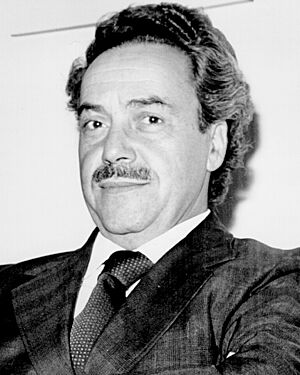Paulo Brossard facts for kids
Quick facts for kids
Paulo Brossard
|
|
|---|---|

Brossard in the 1970s
|
|
| Minister of the Supreme Federal Court | |
| In office 5 April 1989 – 24 October 1994 |
|
| Appointed by | José Sarney |
| Preceded by | Djaci Falcão |
| Succeeded by | Maurício Corrêa |
| Minister of Justice | |
| In office 15 February 1986 – 18 January 1989 |
|
| President | José Sarney |
| Preceded by | Fernando Lyra |
| Succeeded by | Oscar Corrêa |
| Senator for Rio Grande do Sul | |
| In office 1 February 1975 – 1 February 1983 |
|
| Federal Deputy for Rio Grande do Sul | |
| In office 1 February 1967 – 1 February 1971 |
|
| State Deputy of Rio Grande do Sul | |
| In office 1 February 1955 – 1 February 1967 |
|
| Personal details | |
| Born | 23 October 1924 Bagé, Rio Grande do Sul, Brazil |
| Died | 12 April 2015 (aged 90) Porto Alegre, Rio Grande do Sul, Brazil |
| Political party | MDB MDB PL |
| Spouse | Lúcia Alves |
| Children | 3 |
| Parents |
|
| Alma mater | Federal University of Rio Grande do Sul |
|
Other judicial positions
1993–1994: Vice President, Supreme Federal Court
1992–1993: President, Superior Electoral Court 1991–1992: Vice President, Superior Electoral Court 1991–1992: Effective Minister, Superior Electoral Court 1989–1991: Substitute Minister, Superior Electoral Court |
|
Paulo Brossard de Souza Pinto (born October 23, 1924 – died April 12, 2015) was an important Brazilian lawyer and politician. He was born in Bagé, a city in Rio Grande do Sul, Brazil. He studied law and worked in many different government roles. He was a member of Brazil's highest courts and served in the country's parliament.
Contents
Early Life and Education
Paulo Brossard was born in 1924 in Bagé, Rio Grande do Sul. He went to the Federal University of Rio Grande do Sul to study law. He became an expert in constitutional law (rules for how a country is governed) and civil law (rules for private citizens).
Before becoming a politician, he taught law at the Pontifical Catholic University of Rio Grande do Sul. This helped him understand the laws of Brazil very well.
A Career in Politics
Brossard started his political career as a lawmaker. He was first elected to the Legislative Assembly of Rio Grande do Sul, which is like a state parliament. After that, he moved on to the National Congress of Brazil.
He served as a Federal Deputy, which is similar to a representative in the U.S. Congress. Later, he became a Senator, representing his home state of Rio Grande do Sul.
In 1978, during a time when Brazil was under military rule, Brossard ran for Vice President of Brazil. He was part of the MDB party ticket. However, he and his running mate were not elected.
Important Roles in Justice
Paulo Brossard also held very important positions in Brazil's justice system. He became a Minister of the Supreme Federal Court, which is Brazil's highest court. He also served on the Superior Electoral Court, which handles election laws.
- From 1986 to 1989, he was the Minister of Justice for Brazil. This role is like the country's top legal officer.
- From 1989 to 1994, he was a Minister in the Supreme Federal Court.
- He also served as the President of the Superior Electoral Court from 1992 to 1993.
A Key Moment in History
Brossard played a very important part in a major event in Brazilian history in 1985. After years of military rule, Tancredo Neves was elected as the first civilian president. But before he could officially take office, he became very ill.
This caused a lot of confusion about what should happen next. Tancredo Neves's running mate, José Sarney, was supposed to become acting president. Paulo Brossard strongly supported Sarney's right to take on the presidential powers. He famously said, "this is the reason why vice presidents exist."
Sadly, Tancredo Neves passed away without ever taking office. José Sarney then became the full president and completed his term. Brossard's clear legal opinion helped Brazil through this difficult time.
Later Life and Passing
Paulo Brossard passed away on April 12, 2015, at his home in Porto Alegre. He was 90 years old. He is remembered for his long career in public service and his dedication to Brazilian law and politics.
 | John T. Biggers |
 | Thomas Blackshear |
 | Mark Bradford |
 | Beverly Buchanan |

